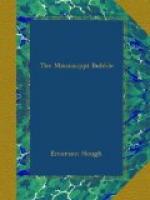“Yes, we will send to the library for your brother,” said Mary Connynge, dimpling at the corners of her mouth.
“No, I think it not needful to do that,” replied Lady Catharine, “but we should perhaps learn what this young man brings, and then we’ll see to it that we chide him so that he’ll no more presume upon our kindness. My brother need not know, and we ourselves will end this forwardness at once, Mary Connynge, you and I. James, you may bring the gentlemen in.”
Enter, therefore, John Law and his brother Will, the former seeming thus with ease to have made good his promise to win past the door of the Earl of Banbury.
John Law, as on the morning of the roadside meeting, approached in advance of his more timid brother, though both bowed deeply as they entered. He bowed again respectfully, his eyes not wandering hither and yon upon the splendors of this great room in an ancestral home of England. His gaze was fixed rather upon the beauty of the tall girl before him, whose eyes, now round and startled, were not quite able to be cold nor yet to be quite cast down; whose white throat throbbed a bit under its golden chain; whose bosom rose and fell perceptibly beneath its falls of snowy laces.
“Lady Catharine Knollys,” said John Law, his voice deep and even, and showing no false note of embarrassment, “we come, as you may see, to make our respects to yourself and your friend, and to thank you for your kindness to two strangers.”
“To two strangers, Mr. Law,” said Lady Catharine, pointedly.
“Yes”—and the answering smile was hard to be denied—“to two strangers who are still strangers. I did but bethink me it was sweet to have such kindness. We were advised that London was cruel cold, and that all folk of this city hated their fellow-men. So, since ’twas welcome to be thus kindly entreated, I believed it but the act of courtesy to express our thanks more seeming than we might as that we were two beggars by the wayside. Therefore, I pay the first flower of my perpetual tribute.” He bowed and extended, as he spoke, a deep red rose. His eye, though still direct, was as much imploring as it was bold.
Instinctively Mary Connynge and Lady Catharine had drawn together, retreating somewhat from this intrusion. They were now standing, like any school girls, looking timidly over their shoulders, as he advanced. Lady Catharine hesitated, and yet she moved forward a half pace, as though bidden by some unheard voice. “’Twas nothing, what we did for you and your brother,” said she. She extended her hand as she spoke. “As for the flower, I think—I think a rose is a sweet-pretty thing.”
She bent her cheek above the blossom, and whether the cheek or the petal were the redder, who should say? If there were any ill at ease in that room, it was not Law of Lauriston. He stood calm as though there by right. It was an escapade, an adventure, without doubt, as both these young women saw plainly enough. And now, what to do with this adventure since it had arrived?




